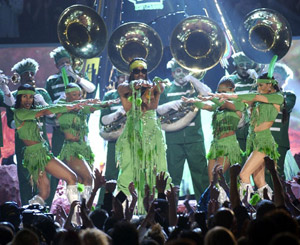 Another response to the Stereotype of the Month entry on the OutKast outrage:
Another response to the Stereotype of the Month entry on the OutKast outrage:
 Another response to the Stereotype of the Month entry on the OutKast outrage:
Another response to the Stereotype of the Month entry on the OutKast outrage:
Hi Rob,
I always read your articles with interest. I am neither a native Indian, nor an American -- I live in Norway as a "white" guy. Anyway, what I wanted to ask is, if Native Americans are not prepared to accept parody and irony on their behalf. Everyone else will have to tolerate that. Here in Norway we have our own native people, the lapps, and they are always joked with. And their official policy on lapp parody is that "it includes us into the bigger society and puts us on level with the rest of Norway" (words to that effect).
In other words, not only do they accept to be parodied like all politicians and famous people must expect to be parodied, but they also see it as a way to be included in the culture and society of the country they live in. They WANT to be "victims of parody" now.
I am sure you would find the same stance in Native American communities. I cannot believe that 100% of all Native Americans would find OutKast's parody offensive.
Best regards,
Glenn
Rob's reply
>> Anyway, what I wanted to ask is, if Native Americans are not prepared to accept parody and irony on their behalf. <<
Native American cultures are known for having a well-developed sense of humor and irony. You can see it in their stories—for instance, where someone is always making a fool of Coyote.
But there are good parodies and bad parodies. Unfortunately, the bad ones happen more often than the good.
In Indian Comics Irregular, I try to highlight examples of "good" humor. Looking over the past issues, I see several productions that used Native humor well. Among them are Dreamkeeper, Brother Bear, Wolf Lake, The Emperor's New Groove, and Saturday Night Live's anniversary show. Even Howard Stern's Son of a Beach episode on Indians wasn't all bad.
>> In other words, not only do they accept to be parodied like all politicians and famous people must expect to be parodied, but they also see it as a way to be included in the culture and society of the country they live in. <<
In the "bad" examples, Anglos are mocking Indians to belittle them and keep them in their place. I'm not sure what's good about that. I'd rather be ignored than be insulted. I don't see how that contributes to the goal of inclusion. I don't think Indians want to be "included" on the white man's terms: as savages, mascots, or greedy casino operators.
See Ethnic Humor and the "Joke of the Day" for a "joke" that seems to be pro-Indian, but isn't.
>> I am sure you would find the same stance in Native American communities. <<
Again, I distinguish between "good" and "bad" humor. I suspect the Native Americans who think about it would also.
>> I cannot believe that 100% of all Native Americans would find OutKast's parody offensive. <<
The vast majority probably never heard about it. But of those who did hear about it, none have said anything favorable about it that I've heard.
What if "only" 70% or 80% of Natives found it offensive? Is that much better? If the majority says a thing is wrong, shouldn't the thing stop? Some might argue it should stop if even a significant minority says it's wrong.
Rob Schmidt
Publisher
PEACE PARTY
The debate continues (6/25/04)....
>> But speaking generally, there is no such thing as "good humour" and "bad humour" because it will never be possible for everyone to agree what is good and what is bad. It's one of those things that cannot be defined. Like good music and bad music, good art or bad art.
Who is to say what is what? Hence, there is only "humour". <<
So if someone makes racist jokes, we can't say it's wrong? We can't do anything except laugh? I don't think so.
Critics define good and bad literature, movies, music, art, etc. all the time. For the most part, they can explain their criteria for judging works. You may not agree with these criteria; they may be so vague and amorphous you can barely understand them. But they exist.
If critics can define a standard for judging art, so can everyone. If this standard is subjective, it doesn't necessarily matter. If the majority of people agree with an aesthetic standard, I'd say, they're right by definition. And the minority who thinks "bad" is "good" is wrong by definition.
>> Speaking from the Norwegian paralell of our native lapps, they take as much heat from comedians as everyone else, and even if they dont always find it funny, they appreciate that they are now included in the society. <<
I'm sure some blacks appreciated being "included in society" when minstrel shows and Amos 'n' Andy made fun of them. That was an initial, naive response that didn't last long. Once they realized how society was mocking and insulting them, they got angry at these allegedly innocent portrayals.
Rob
Related links
Ethnic humor and the "Joke of the Day"
"It's just a [fill in the blank]"
|
. . . |

|
All material © copyright its original owners, except where noted.
Original text and pictures © copyright 2007 by Robert Schmidt.
Copyrighted material is posted under the Fair Use provision of the Copyright Act,
which allows copying for nonprofit educational uses including criticism and commentary.
Comments sent to the publisher become the property of Blue Corn Comics
and may be used in other postings without permission.